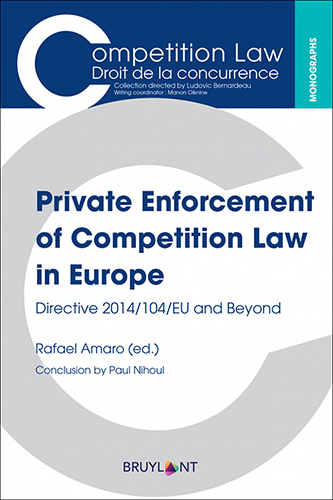
Private Enforcement of Competition Law in Europe: publié en mai 2021. Maria José Azar-Baud et Fabienne Jault-Seseke ont écrit le chapitre 5 «Collective redress – European and private international law approach»
Vous pouvez lire la table des matières ici.
Summary of the chapter
The Proposal of Directive on representative actions redress does not encompass competition infringements, and the Antitrust Damages Actions Directive does not include collective redress mechanisms. While both set of rules pursue effectiveness, access to justice, and full compensation, the articulation between private and public enforcement in areas such as consumer and competition law seems neglected. Therefore, although the Antitrust Damages Actions Directive has been an important step in the development of private enforcement in competition law, its effectiveness still depends on concrete national implementation, especially in terms of collective redress.
In the Member States, transposition has required the adoption of measures embracing competition law, civil law, and civil procedure law. Notwithstanding, the Damages Directive did not remove forum shopping concerns, and the removal of specific provisions on collective actions remains questionable.
Therefore, some European capitals such as London and Amsterdam remain particularly attractive forums for collective redress on behalf of victims of anti-competitive practices. It has also been regretted 369 that there is no provision for cooperation between Member States’ courts, even though competition litigation is often cross-border. In the end, “the rules set out appear to be mainly the result of a compromise a minima”.
Furthermore, both the Damages Directive and the Representative Actions Proposal aim at strengthening confidence on the internal market and its proper functioning. And even if cross border representative actions are enacted in the Proposal, international private law considerations are missing in both texts.
Summary of the book
The book introduces the reader to key legal provisions and case-law related to the procedural and substantive issues that may arise in damages litigation for breach of anti-competitive agreements and abuses of a dominant position prohibitions.
For the past decade, academic publications have focused on the proposal for a Directive on damages actions, then the Directive 2014/104/EU of 26 November 2014 itself, and finally the transposition texts. However, this understandable interest should not lead to overlook the fact that the Directive has been applied very little until now. This is mainly due to its application ratione temporis. In addition to the fact that Member States only transposed the Directive between the end of 2016 and 2018, Article 22 of the Directive provides that the substantive rules contained in the Directive cannot be applied to infringements subsequent to the national laws transposing them, while the procedural rules of the Directive apply to proceedings commenced on or after 26 December 2014. Thus, it is prior domestic law that continues to govern the vast majority of cases before national courts in the “Pre-Directive era.” In addition, a number of issues of the utmost importance have not been addressed by the Directive, such as questions of international jurisdiction or the quantification of “interests.” For these reasons, it seemed necessary not to limit this book to commenting on the Directive, important as it is, but to go beyond it.
Directed by Rafael Amaro, this book contains the contributions from leading academics, attorneys, jurists and economists in the field of the private enforcement of competition law. It is composed of thematic chapters dealing with matters such as applicable law in international litigation, limitation, quantification of damages, from both a European Union and a national perspective, as well as national chapters presenting the state of play in several European States.
